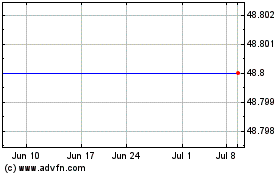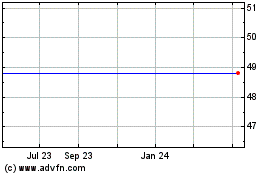Exelon Statement on Illinois Nuclear Power Plant Report
January 12 2015 - 8:00AM
Business Wire
Exelon today issued the following statement on the State of
Illinois report on potential nuclear power plant closings prepared
in response to House Resolution 1146:
We thank the state for its attention and work on such an
important issue for Illinois and the future of the state’s energy
assets. The report confirms that the state’s six nuclear power
plants provide substantial economic and environmental benefits to
Illinois residents and businesses. It also highlights the negative
impacts closing one or more of the state’s nuclear facilities
prematurely would have on Illinois’ economy, energy prices and
carbon emissions, and concerns it would raise about the reliability
of the electric grid. The report makes clear that the future of
Illinois’ nuclear power plants should be an issue of statewide
concern.
The report says: “The state of Illinois is ranked 5th in
electricity generation and 9th in electricity consumption within
the US. Illinois operates as a net exporter of electricity in
the Midwest region. The fact that Illinois is a net exporter of
energy is significant and acts as key asset… If Illinois is to
continue as net exporter of energy under the U.S. Environmental
Agency’s (EPA) proposed carbon dioxide reduction rule that will
take effect in June 2015, Illinois will have to act to maintain
existing clean energy assets as well as develop new clean energy
assets.” (pages 125-126)
The report finds that closing the three Illinois nuclear plants
at greatest risk of early retirement would have a significant
negative economic impact on the state, including $1.8 billion in
annual lost economic activity and more than 7,800 job losses, and
that the resulting increase in carbon emissions would have a
societal cost of more than $18 billion. It also concludes that the
closures would increase wholesale electricity costs in the northern
Illinois region served by ComEd by up to 9.9 percent, or $437
million, in the first year.
The report says: “Nuclear power assets are integral parts of
their host communities and provide real economic benefits.
Expenditures with local suppliers, direct and indirect jobs, tax
revenues, and other contributions to local economies make nuclear
generating stations some of the most valued economic assets in
Illinois.” (page 129)
We continue to believe that the best, most cost-effective
approach for preserving the benefits these plants provide is a
market-based solution that properly values the emissions-free,
always-on energy they generate. The report presents several
potential policy solutions and is a good starting point for
discussions with lawmakers and other stakeholders about the right
path forward for continuing to meet Illinois’ energy needs.
The report states: “Illinois’ continued economic success depends
on maintaining low and stable electricity prices – and those low
and stable prices depend on the continued operation of all nuclear
generating stations located in Illinois. Eventually, market forces
and national policies will fully compensate nuclear plant operators
for their reliability and carbon-free emissions. Until that time,
Illinois has the opportunity to craft effective market-based
solutions that can support all forms of low carbon power generation
to be sited in Illinois for the benefit of Illinois’ economy and
citizens.” (page 125)
Exelon Corporation (NYSE:EXC) is the nation’s leading
competitive energy provider, with 2013 revenues of approximately
$24.9 billion. Headquartered in Chicago, Exelon does business in 48
states, the District of Columbia and Canada. Exelon is one of the
largest competitive U.S. power generators, with more than 35,000
megawatts of owned capacity comprising one of the nation’s cleanest
and lowest-cost power generation fleets. The company’s
Constellation business unit provides energy products and services
to more than 2.5 million residential, public sector and business
customers, including more than two-thirds of the Fortune 100.
Exelon’s utilities deliver electricity and natural gas to more than
7.8 million customers in central Maryland (BGE), northern Illinois
(ComEd) and southeastern Pennsylvania (PECO). Follow Exelon on
Twitter @Exelon.
Exelon Corporate CommunicationsPaul Elsberg, 312-394-7417
Exelon (NYSE:EXC)
Historical Stock Chart
From Mar 2024 to Apr 2024

Exelon (NYSE:EXC)
Historical Stock Chart
From Apr 2023 to Apr 2024
